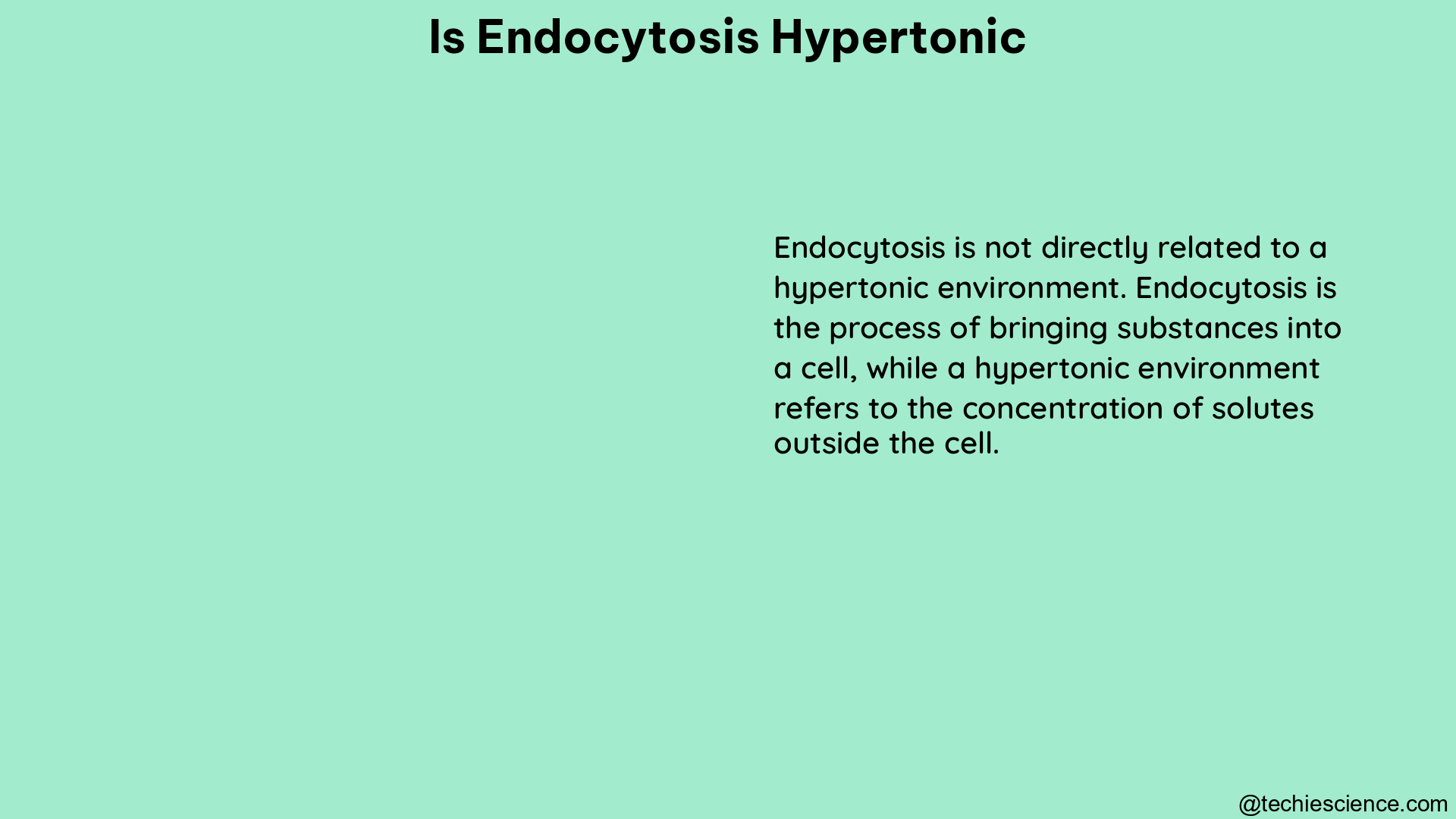Endocytosis is a fundamental cellular process by which cells internalize substances from their external environment, including nutrients, signaling molecules, and even pathogens. The question of whether endocytosis is affected by hypertonic conditions, where the extracellular fluid has a higher solute concentration than the intracellular fluid, is a complex one that has been the subject of extensive research.
Understanding Endocytosis and Osmotic Conditions
Endocytosis is a highly regulated process that involves the invagination of the cell membrane to form a vesicle that encapsulates the desired cargo. This process is essential for a wide range of cellular functions, including nutrient uptake, cell signaling, and immune response.
In hypertonic conditions, the extracellular fluid has a higher solute concentration than the intracellular fluid, leading to a net flow of water out of the cell. This can result in a decrease in cell volume and an increase in intracellular solute concentration. These changes in the cellular environment can potentially impact the process of endocytosis in various ways.
Effects of Hypertonic Conditions on Endocytosis

-
Reduced GLUT4 Endocytosis: A study conducted on L6-GLUT4myc cells, a cell line used to study glucose transport, found that hyperosmolarity (high solute concentration) reduces the endocytosis of the glucose transporter GLUT4. This suggests that hypertonic conditions may inhibit the internalization of certain membrane proteins, potentially affecting nutrient uptake and cell signaling.
-
The study showed that hyperosmolarity led to a decrease in the rate of GLUT4 endocytosis, with a concomitant increase in its surface expression.
-
The researchers proposed that the reduced endocytosis of GLUT4 under hypertonic conditions may be a cellular adaptation to maintain glucose uptake and energy homeostasis.
-
Cell Volume Regulation: Another study using HeLa Kyoto cells, a widely used human cell line, found that hypotonic (low solute concentration) shocks led to a rapid increase in cell volume, while hypertonic shocks led to a rapid decrease in cell volume. This indicates that cells can dynamically adjust their volume in response to changes in the osmotic environment.
-
While this study did not directly measure the effect of osmotic shocks on endocytosis, it suggests that cells may use various mechanisms, including endocytosis and exocytosis, to regulate their volume and maintain homeostasis.
-
Theoretical Modeling: A theoretical framework has been developed to study the dynamics of cell volume, endocytosis, and exocytosis in response to osmotic shocks and mechanical loadings. This model suggests that hypotonic shocks stimulate exocytosis, while hypertonic shocks stimulate endocytosis.
-
The model proposes that cells may use endocytosis as a mechanism to regulate their volume and membrane tension in response to changes in their external environment.
- This is consistent with the idea that cells can dynamically adjust their membrane surface area and internal volume to maintain homeostasis and adapt to various environmental conditions.
Factors Influencing the Relationship between Endocytosis and Hypertonic Conditions
The relationship between endocytosis and hypertonic conditions is complex and can be influenced by several factors, including:
-
Cell Type: Different cell types may exhibit varying responses to hypertonic conditions, as their endocytic machinery and regulatory mechanisms may differ.
-
Cargo Specificity: The effect of hypertonic conditions may depend on the specific cargo being internalized through endocytosis, as different cargoes may be differentially affected by changes in the cellular environment.
-
Endocytic Pathways: There are multiple endocytic pathways, such as clathrin-mediated endocytosis, caveolae-mediated endocytosis, and macropinocytosis, and the impact of hypertonic conditions may vary across these different mechanisms.
-
Temporal Dynamics: The effects of hypertonic conditions on endocytosis may be time-dependent, with cells potentially exhibiting different responses at different stages of the endocytic process or over longer time scales.
-
Compensatory Mechanisms: Cells may employ various compensatory mechanisms, such as changes in gene expression, signaling pathways, or cytoskeletal rearrangements, to adapt to hypertonic conditions and maintain endocytic function.
Conclusion
In summary, the relationship between endocytosis and hypertonic conditions is a complex and active area of research. While some studies have suggested that hypertonic conditions can affect the rate of endocytosis, particularly for specific cargoes like the glucose transporter GLUT4, the underlying mechanisms and the extent of this relationship are not yet fully understood.
Theoretical models and experimental evidence indicate that cells may use endocytosis, along with other volume regulation mechanisms, to adapt to changes in their external osmotic environment. However, the specific responses can vary depending on the cell type, cargo, endocytic pathways, and temporal dynamics involved.
Continued research in this field will help elucidate the intricate interplay between endocytosis and hypertonic conditions, providing valuable insights into cellular homeostasis, signaling, and adaptation to environmental challenges.
References:
- Elife Sciences. (2014). Hyperosmolarity reduces GLUT4 endocytosis and increases its surface expression in L6-GLUT4myc cells.
- BioRxiv. (2021). A theoretical framework for the dynamics of cell volume, endocytosis, and exocytosis in response to osmotic shocks and mechanical loadings.
- Science Direct. (2020). Mechanistic insights into the regulation of GLUT4 trafficking by hyperosmotic stress.
- Journal of Cell Science. (1998). An image correlation analysis of the distribution of the transferrin receptor in transferrin-depleted human HeLa cells.
- Science Direct. (2021). A theoretical framework for the dynamics of cell volume, endocytosis, and exocytosis in response to osmotic shocks and mechanical loadings.
I am Ankita Chattopadhyay from Kharagpur. I have completed my B. Tech in Biotechnology from Amity University Kolkata. I am a Subject Matter Expert in Biotechnology. I have been keen in writing articles and also interested in Literature with having my writing published in a Biotech website and a book respectively. Along with these, I am also a Hodophile, a Cinephile and a foodie.